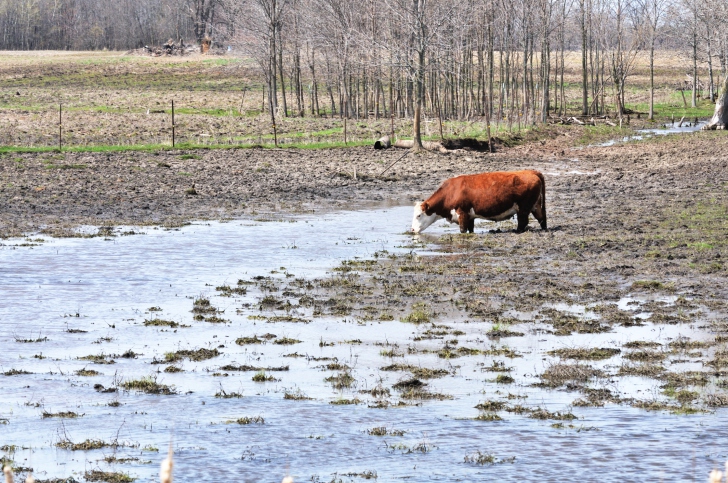In a bipartisan vote, the U.S. Senate passed a Congressional Review Act (CRA) joint resolution to overturn the Biden administration’s revised rule regulating Waters of the United States (WOTUS) under the 1972 Clean Water Act (CWA).
The Biden administration’s WOTUS rule greatly expands the amount of private property and state lands under the control of federal regulators.
Senate, States Disapprove of WOTUS
The resolution of disapproval was initially introduced and led by Sen. Shelley Moore Capito (R-WV), ranking member of the Senate Environment and Public Works (EPW) Committee, and passed the Senate with a vote of 53-43.
The bipartisan vote shows the administration that a broad array of people and interests—like farmers, ranchers, developers, and states—think the rule represents gross federal interference in the management of their lands, said Capito, in a press release.
“By voting to overturn President Biden’s waters rule, we are sending a clear, bipartisan message that Congress, even a divided one, will defend working Americans in the face of executive overreach,” Capito said. “I’m proud to lead my colleagues in standing up for farmers and ranchers, landowners and builders, and energy and infrastructure workers across the United States.”
This CRA’s passage came after 24 state attorneys general (AG) filed a lawsuit to block the Biden administration’s WOTUS rule. The AGs argue the new regulation is nothing more than a brazen attempt by the U.S. Environmental Protection Agency (EPA) to gain more power over supposed wetlands in “an unlawfully aggressive way.”
On April 6, the Biden administration vetoed the CRA blocking its WOTUS revision, meaning the rule will go into effect for now.
Lawful, Workable, Durable Definition Remains Elusive
The EPA and U.S. Army Corps of Engineers (Corps) finalized the new rule even as a case related to WOTUS was working its way through the Supreme Court, says Charles Yates, an attorney at the Pacific Legal Foundation.
“The Biden administration’s revised definition of “navigable waters” is a staggering example of federal overreach,” Yates said. “But making matters worse, it has been issued in advance of the Supreme Court providing crucial guidance in Sackett II.
“If anything is clear, it is that absent definitive guidance from the Supreme Court, a lawful, workable, and durable definition of ‘navigable waters’ will remain elusive,” Yates said.
Between the Obama Administration’s 2015 rule that initially expanded the definition of WOTUS by dropping the limiting factor of “navigable” from the waters covered, to the Trump administration’s attempt to replace Obama’s WOTUS with a definition that limited federal control by providing greater clarity concerning what lands were covered, to Biden administration’s reversal of Trump’s rule, there has been a battle over what counts as a wetland and which waters were covered under the CWA for years, says Yates.
“The last three presidential administrations have failed to craft a regulatory definition of ‘navigable waters’ that both satisfies the requirements of the Clean Water Act and survives judicial review,” Yates said.
‘Regulatory Ping-Pong’
Yates says this back-and-forth is particularly hard on landowners, who are expected to stay up to date on laws and regulations under the CWA, lest they are hit with any fines by the EPA.
“With each change, landowners have been forced to conform to an ever-shifting standard at enormous expense, and at pains of immense liability,” said Yates. “By refusing to wait for a decision in Sackett II, the Biden administration has brushed aside the freedom, security, and prosperity of millions of American landowners.
“Instead, it has decided to perpetuate this continuous game of regulatory ping-pong, piling confusion, on to fifteen years of confusion,” said Yates.
Abuse of the Clean Water Act
The new rule is too expansive to be useful to anyone but regulators who want to pick and choose what landowners to victimize, says Daren Bakst, a senior fellow at the Competitive Enterprise Institute.
“It goes way beyond [bodies of water] and even covers what most people would think is dry land,” Bakst said. “It’s a federal power grab that uses vague and subjective language to allow the EPA and Corps to regulate at their whim.
“The Senate’s bipartisan passage of the WOTUS CRA resolution was important, even though President Biden vetoed it,” Bakst said. “Now that both the House and Senate have passed the resolution, Congress has made it perfectly clear that decades of EPA and Corps abuse of the Clean Water Act needs to stop.”
The Supreme Court should issue its opinion on Sackett v. EPA, in which a family was threatened by the EPA with extreme daily fines for attempting to build a home on their land, by June. This ruling will make the Biden WOTUS definition “moot,” says Bakst.
“The administration couldn’t even wait a few months for this opinion that is expected to clarify what waters can be regulated under the Clean Water Act,” Bakst said. “Instead, it chose to create even more confusion for property owners by prematurely finalizing its rule.
“That by itself is indefensible,” Bakst said.
Federal courts issued stays of both the 2015 Obama administration WOTUS rule and the Trump administration’s revised rule, meaning neither ever took effect.
Linnea Lueken (llueken@heartland.org) is a research fellow with the Arthur B. Robinson Center on Climate and Environmental Policy at The Heartland Institute.
